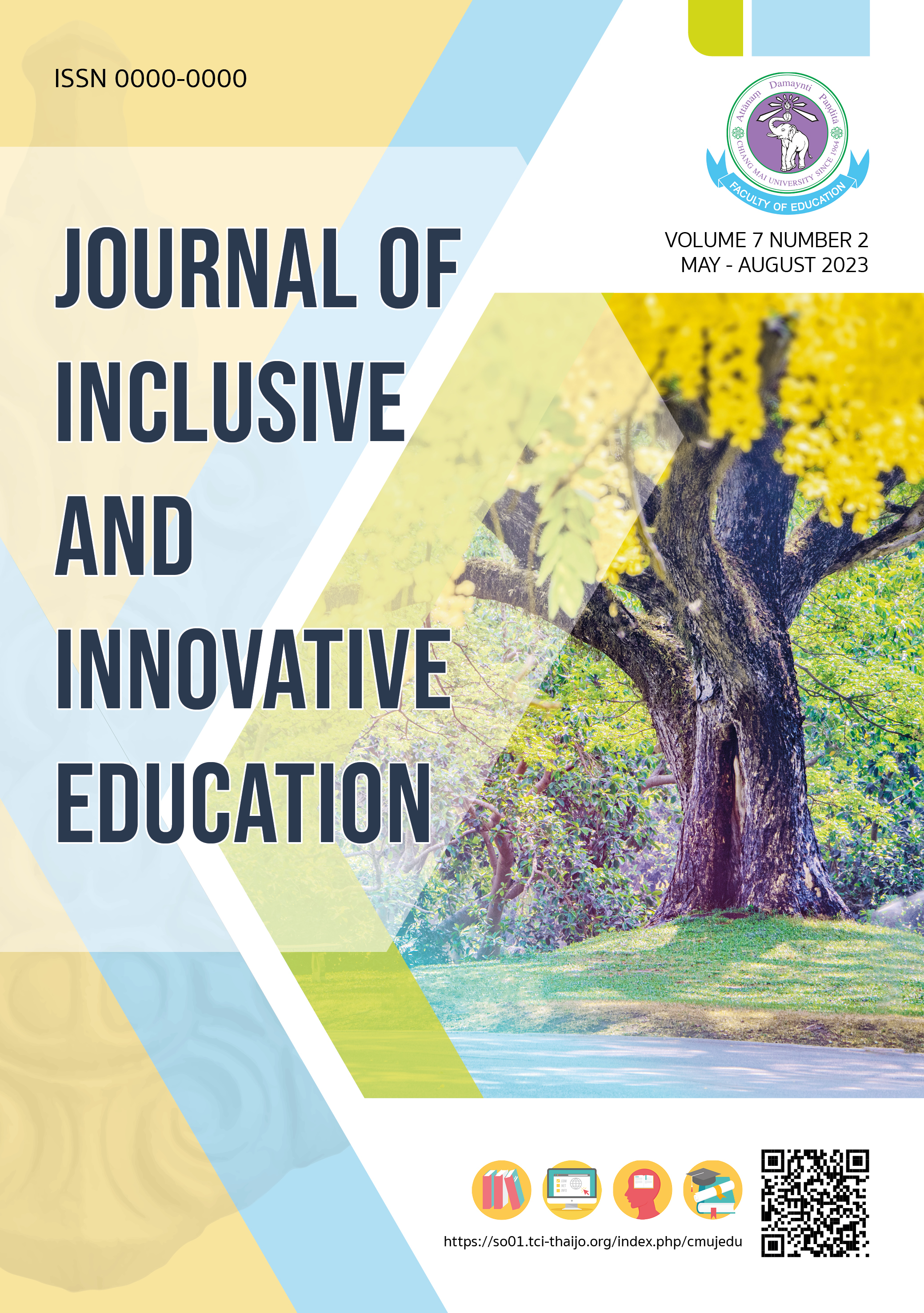The Effects of Loose Parts Play Activity Provision on Relationship Skill of Young Children
Main Article Content
Abstract
The objective of this study was to study the effects of loose parts play activity provision on relationship skill of young children. The subject were 24 boys and girls age between 3-4 years old studying in kindergarten level 1 in the second semester of academic year 2022, Ramkhamhaeng University Demonstration School (Elementary Department) under the Ministry of Higher Education, Science, Research and Innovation.The tools used in the study were 1)12 plans of loose parts plays activity in free time periods and 2) observation form of relationship skill behaviors for young children. Quantitative data were analyzed by mean and standard deviation, qualitative data were analyzed by content analysis.
The study found that young children had the relationship skill mean scores before receiving loose parts plays activity was 22.71 and the standard deviation was 4.18. And after receiving the activity, the mean scores was 33.75 and the standard deviation was 2.66. In other words, young children had higher relationship skills than before the loose parts plays activity.The aspect with the highest mean scores child-child relationship skills was 16.92 and the standard deviation was 1.28 and child-adult relationship skills was 16.83 and the standard deviation was 1.46 respectively
Article Details

This work is licensed under a Creative Commons Attribution-NonCommercial-NoDerivatives 4.0 International License.
หากผู้เสนอบทความมีความจำเป็นเร่งด่วนในการตีพิมพ์โปรดส่งลงตีพิมพ์ในวารสารฉบับอื่นแทน โดยกองบรรณาธิการจะไม่รับบทความหากผู้เสนอบทความไม่ปฏิบัติตามเงื่อนไขและขั้นตอนที่กำหนดอย่างเคร่งครัด ข้อมูลของเนื้อหาในบทความถือเป็นลิขสิทธิ์ของ Journal of Inclusive and Innovative Education คณะศึกษาศาสตร์ มหาวิทยาลัยเชียงใหม่
References
Aperture Education. (2021). DESSA Strategies Guide: Relationship Skills. Retrieved from https://f.hubspotusercontent30.net/hubfs/2613587/Guides%20-%20BTSG,%20SSG/Aperture%208%20Guide_2021.pdf?hsCtaTracking=7280d604-fc2d-4f36-b3a8-13e2539ea7d0%7C7e4cfb29-8edc-4f3d-aadf-791a9feb1d4c.
Australian Children’s Education & Care Quality Authority. (2016). Relationships With Children. Retrieved from
Bowornwattanaset, C. (2016). Instructional Strategies Based on Scaffolding Theory. Prae-wa Kalasin Journal of Kalasin University, 3(2), 154-179.[in Thai]
Bureau of Academic Affairs and Educational Standards, Office of the Basic Education Commission &Ministry of Education of Thailand. (2022). Guidelines for resolving the effects of recession on early childhood development and learning. n.d.[in Thai]
CASEL. (2022). Relationship Skills. Retrieved from https://casel.org/fundamentals-of-sel/what-is-the-casel-framework/#relationship.
Casey and Robertson. (2019). Loose Parts Play. Retrieved from https://www.inspiringscotland.org.uk/wp-content/uploads/2020/09/Loose-Parts-Play-Toolkit-2019-web.pdf.
Division of Early Learning Florida Department of Education. (2017). Social and Emotional Development. Retrieved from http://flbt5.floridaearlylearning.com/standards.html#a=two_year_olds,three_year_olds,four_year_olds.
Equitable Education Research Institute (EEFI). (2022). Learning Loss. Retrieved from https://research.eef.or.th/learning-loss-recession/.[in Thai]
Flannigan, C. and Dietze, B. (2017). Children, Outdoor Play, and Loose Parts. Journal of Childhood Studies, 42(4), 53-60.
Illinois Early Learning and Development Standards. (2013). Illinois Early Learning and Development Standards. Retrieved from https://illinoisearlylearning.org/wp-content/uploads/2017/02/ields.pd.
Hemchayart, W. et al. (2022). Documentation of Loose Parts Workshop : The Miracle of Creative Thinking in the 21st Century on March 12, 2022. Retrieved from https://anyflip.com/cymfb/glyt/basic.[in Thai]
Junlasak, S., Hemchayart, W. (2021). Parents’ Roles in Promoting Loose Parts Play in the Loose Parts Kits Project. An Online Journal of Education, 17(2), 1-14.[in Thai]
Khayankij, S. and Pittayapitak, T. (2021). Loose parts play to promote creative thinking in young children. Retrieved from http://www.curativethailand.com/pdfbook/%E0%B8%84%E0%B8%B9%E0%B9%88%E0%B8%A1%E0%B8%B7%E0%B8%AD%20%E2%80%9C%E0%B8%AA%E0%B8%B7%E0%B9%88%E0%B8%AD%20%E0%B9%80%E0%B8%A5%E0%B9%88%E0%B8%99%20%E0%B8%AA%E0%B8%A3%E0%B9%89%E0%B8%B2%E0%B8%87%E2%80%9D%E0%B9%80%E0%B8%9E%E0%B8%B7%E0%B9%88%E0%B8%AD%E0%B8%9E%E0%B8%B1%E0%B8%92%E0%B8%99%E0%B8%B2%E0%B8%81%E0%B8%B2%E0%B8%A3%E0%B8%84%E0%B8%B4%E0%B8%94%E0%B8%82%E0%B8%AD%E0%B8%87%E0%B9%80%E0%B8%94%E0%B9%87%E0%B8%81%E0%B8%9B%E0%B8%90%E0%B8%A1%E0%B8%A7%E0%B8%B1%E0%B8%A2.pdf. [in Thai]
Klintavorn, W. (2020). The Effect of Using Story to Enhance Life Skills of Young Children Lampang Primary Education Service Area Office1. Journal of Inclusive and Innovative Education, 4(3), 93-105.[in Thai]
Ministry of Education of Thailand. (2017). The Early Childhood Curriculum B.E. 2560 (A.D. 2017). Bangkok: Teachers Council of Thailand Printing House Ladprao.[in Thai]
Ministry of Education Republic of Singapore. (2013). Nurturing Early Learners A Curriculum for Kindergartens in Singapore: Social and Emotional Development. Ministry of Education: Republic of Singapore.
Nicholson, S. (1972). How Not to Cheat Children The Theory of Loose Parts. Retrieved from https://media.kaboom.org/docs/documents/pdf/ip/Imagination-Playground-Theory-of-Loose-Parts-Simon-Nicholson.pdf.
Parsook, N. et al. (2022). Effect of Using Inquiry Approach and Social Constructivism on Social Studies Learning Achievement and Problem Solving Ability of Mathayomsuksa Two Students. Journal of Inclusive and Innovative Education, 6(3), 72-86.[in Thai]
Pinyoanuntapong, S. (2007). Research on Early Childhood Education. Bangkok: Suan Dusit University.[in Thai]
Play Scotland. (2020). Playful Schools: The power of Loose Parts Play. Retrieved from https://www.playscotland.org/resources/print/PS0025-Play-Scotland-Playful-Schools-Report-2.pdf?plsctml_id=20352.
Rangdaeng, M. et. al. (2022). Provision of Learning Experiences Integrated in PhysicSubject Matter by Using the Engineering Design Process on Science Skills of Young Children. Journal of Inclusive and Innovative Education, 6(3), 131-145.[in Thai]
Spencer, R, A. et al. (2019). Educator perceptions on the benefits and challenges of loose parts play in the outdoor environments of childcare centres. AIMS Public Health. 6(4), 461-476.
Sutthiboon, P. and Khayankij, S. (2022). Effects of Organizing Guided Play Activities and Outdoor Loose Parts Towards Collaborative Play Behaviors of Kindergarteners. An Online Journal of Education, 17(1), 1-14.[in Thai]
Taxas Education Agency. (2022). 2022 TEXAS Prekindergarten Guidelines PK3 and PK4 Comprehensive Guide. Retrieved from https://tea.texas.gov/academics/early-childhood-education/2022-texas-pkg-comprehensive-guide.pdf.
The Massachusetts Department of Early Education and Care, et.al. (2015). Massachusetts Standards for Preschool and Kindergarten Social and Emotional Learning, and Approaches to Play and Learning. Retrieved from https://www.dy-regional.k12.ma.us/sites/g/files/vyhlif4331/f/uploads/sel-apl-standards_2015.pdf.
Wongaree, S. (2016). Documentation of Psychology for Teachers. UdonThani: Faculty of Education, UdonThani Rajabhat University.[in Thai]


